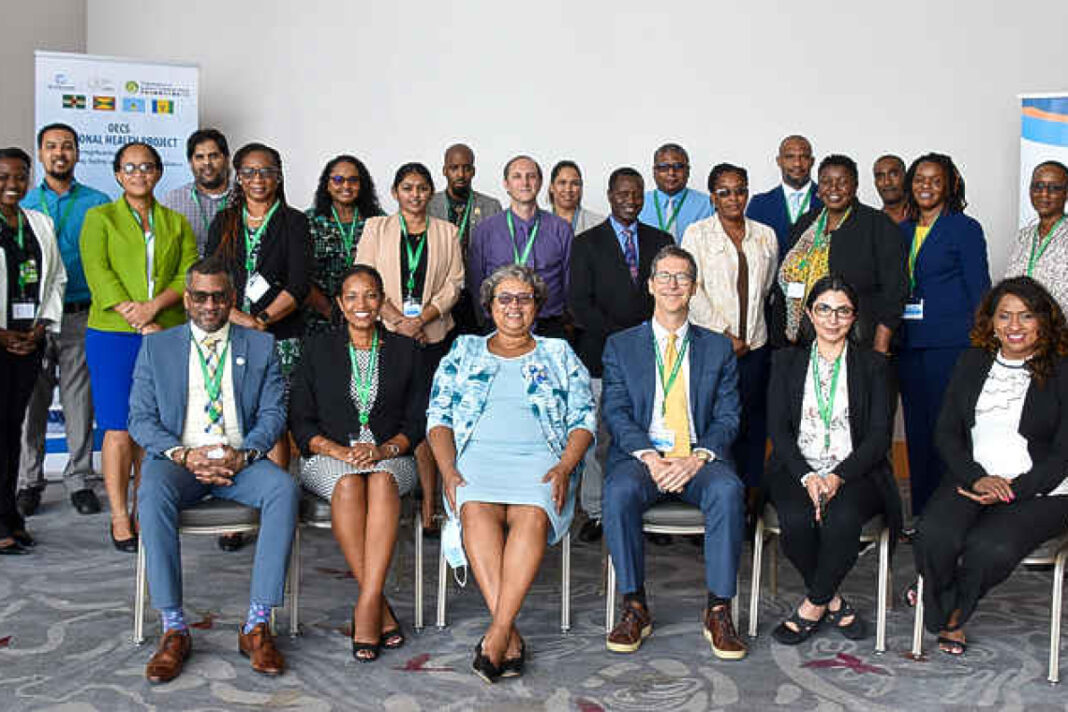Representatives from the World Bank, the OECS Commission and participating countries.
PORT-OF-SPAIN, Trinidad–According to a press release, the World Bank has provided more than forty million United States (US) dollars under the Organisation of Eastern Caribbean States Regional Health Project to improve health facilities and laboratory capacities, strengthen public health systems and emergency management, institutional capacity building, project management and coordination, and contingency emergency response.
Project beneficiaries include Dominica, Grenada, St. Lucia, St. Vincent and the Grenadines, the Caribbean Public Health Agency (CARPHA), and the Organisation of Eastern Caribbean States (OECS) Commission.
Small island developing states (SIDS) within the Caribbean are particularly vulnerable to threats posed by climate change – from rising sea levels, hurricanes and floods, to increased temperatures and intensity of changing weather patterns. The project provides support to these OECS states to protect themselves from the devastating impact of disasters, pandemics and emergencies.
From December 12-14, 2022, beneficiaries of the project came together at the Hyatt Regency Trinidad for the seventh Regional Project Advisory and Mid-term Review meeting. Executive Director for CARPHA Dr. Joy St. John shared some of the project gains, noting that “we have executed several contracts, serviced and purchased equipment, engaged several consultants, ramped up our communications outreach and contributed, not just to the pandemic response, but most critically towards improving the resilience of public health services across the region.”
Director of Surveillance, Disease, Prevention and Control for CARPHA Dr. Lisa Indar expressed the agency’s “appreciation to all members for their strong commitment to this project, despite the challenges encountered and the increased workload involved in our robust response to the ongoing pandemic and regional public health.”
Human Development Programme Leader for the World Bank Timothy Johnston acknowledged that “under the OECS Regional Health Project, all six entities are making valuable investments and strengthening their health systems, particularly in the areas of surveillance, laboratories, work force development and emergency management.”
Project Manager for the OECS Commission Faith Harry-Jn Baptiste indicated that “under the OECS Regional Health Project, significant strides have been made towards the development of an inventory and Geographic Information System (GIS) mapping of emergency and critical care facilities and services, harmonised registration of health professionals; and has advanced efforts towards the creation of a multisectoral, multi-hazard emergency preparedness, mitigation, response and recovery mechanism within the region.”
Programme Coordinator for the Ministry of Health, Wellness and New Health Investments Dominica Sylvester Henderson posited that “standing together, we share intellectual resources and expertise, we share past experiences, and a resolve to be resilient, we share a common desire to thrive under difficult circumstances. The OECS Regional Health Project presents us with an opportunity to showcase this ability to come together and be strong as a unit.”
For the duration of the meeting, participants were able to benefit from project updates, knowledge exchange and training in Financial Management Safeguards, led by Co-Task Team Leader Behnaz Bonyadian and members of the World Bank Team.
Representatives from the World Bank, the OECS Commission and participating countries were also given an opportunity to tour the CARPHA Medical Microbiology Laboratory to view the equipment that was procured under the project.








